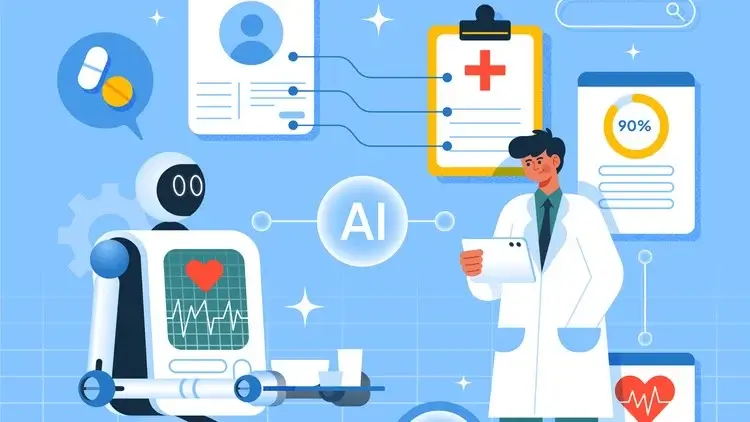Top AI Certificate Programs: Comparing Business Strategy & Healthcare Applications

Artificial Intelligence has quietly slipped into the backbone of how industries operate. It’s not just a tech topic anymore – it’s reshaping the way businesses plan their future and how hospitals care for patients. From predicting customer behavior to detecting disease earlier than ever, AI is rewriting the rulebook.
Naturally, professionals are asking: Where can I learn this? Which programs actually prepare me for the real world instead of just teaching code? The answer depends on whether your focus is business, healthcare, or a mix of both. A number of top universities have stepped in with certificate courses designed for executives, managers, and clinicians who want to put AI to work.
Here’s a look at some of the most respected options available today – and how they stack up against each other.
1. Johns Hopkins University – AI in Business Strategy
For many companies, the hardest part of adopting AI isn’t building the technology – it’s knowing how to use it strategically. That’s where Johns Hopkins University (JHU) steps in. Its AI in Business Strategy program is aimed at leaders who want to connect the dots between what AI can do and what their business needs.
Unlike many courses that bury you in coding, this certificate keeps the focus on decision-making. Learners walk away with a clear idea of how to spot opportunities for AI, how to apply data to real business challenges, and how to turn innovation into measurable value.
Key aspects include:
- Learning adoption frameworks that help companies avoid “AI for the sake of AI.”
- Exploring case studies that show how competitors are using AI to win market share.
- Understanding data-driven decision-making at a strategic, not just technical, level.
Comparison with others:
- MIT Sloan runs the well-known Artificial Intelligence: Implications for Business Strategy. While excellent, it’s costlier and tends to cater to senior executives with bigger budgets.
- Harvard Business School folds AI into broader executive courses but doesn’t offer a focused certificate like JHU.
- Stanford Online emphasizes entrepreneurial applications of AI, which may be ideal for tech founders but not as accessible for managers outside the tech bubble.
For professionals who want practical, boardroom-ready skills without turning into data scientists, the Johns Hopkins option strikes a refreshing balance.
2. MIT Sloan – Artificial Intelligence: Implications for Business Strategy
It’s impossible to ignore MIT when talking about AI programs. The Sloan School of Management offers one of the most recognized executive-level courses, and its brand alone carries weight. Participants get a sharp look at how AI is transforming industries, and the course challenges leaders to rethink entire business models.
Upside: Global recognition, powerful alumni network, and a strong link with MIT’s tech ecosystem.
Downside: Higher cost and a program that assumes participants are already operating at a senior strategic level.
It’s a fantastic option for CEOs or directors in large firms. But for someone earlier in their leadership journey, the Johns Hopkins program may feel more approachable.
3. Johns Hopkins University – AI in Healthcare
Healthcare is changing faster than ever. AI is already reading scans, predicting patient risks, and helping reduce costs in hospitals worldwide. Johns Hopkins, known globally for excellence in medicine and research, has designed a certificate specifically for healthcare professionals who want to understand this shift.
This isn’t about learning to code algorithms – it’s about seeing how those algorithms can change clinical practice and healthcare administration.
Highlights of the program:
- Applications like diagnostic imaging, patient monitoring, and predictive analytics.
- A close look at the ethical, legal, and regulatory challenges unique to healthcare.
- Practical insight into how hospitals and systems are using AI today.
How it stacks up against others:
- Stanford Medicine offers similar courses, but they lean technical and often target researchers.
- Harvard Medical School has AI workshops for clinicians, though these are shorter in length and less detailed.
- Coursera’s healthcare AI programs are affordable and flexible, but they don’t carry the same recognition that a Johns Hopkins certificate does.
For doctors, nurses, or administrators who want to stay ahead of the curve, this program provides both credibility and usable knowledge.
4. Stanford University – AI and Healthcare Innovation
Stanford has long been at the crossroads of healthcare and Silicon Valley innovation, and its courses reflect that. Its AI programs dive deep into the mechanics of algorithms and medical research applications.
Strengths: A research-heavy, cutting-edge perspective.
Weaknesses: Can be overly technical, leaving non-technical healthcare leaders struggling to connect the dots.
If you’re aiming to be at the frontlines of research, Stanford makes sense. If you’re a healthcare professional looking for practical, patient-facing insights, Johns Hopkins is usually the better fit.
5. Harvard University – Executive Programs in AI
Harvard approaches AI more broadly, weaving it into its executive education modules. These short programs are designed to give decision-makers a taste of how AI will affect industries from finance to healthcare.
Pros: Brand prestige and networking opportunities.
Cons: Higher cost and limited depth, since the programs are not as specialized as dedicated certificates.
For a quick immersion, Harvard delivers. For deeper learning, the Johns Hopkins programs are more structured and targeted.
6. Coursera & edX – Flexible Online Options
Not everyone has the budget or schedule for an Ivy League certificate. Platforms like Coursera and edX provide accessible alternatives, offering AI courses created by institutions such as Google, the University of Michigan, and HarvardX.
Pros: Flexible, affordable, and ideal for beginners.
Cons: Recognition is limited, and the learning experience isn’t as immersive as a university-led program.
For professionals who simply want exposure, these platforms are a great starting point. For those looking to showcase advanced skills, more formal programs carry more weight.
Final Thoughts
AI is now a professional necessity, not a “nice-to-have.” The right program depends on where you see your career heading.
- If you’re steering business growth and want to integrate AI into strategy, the AI in Business Strategy certificate from Johns Hopkins delivers practical tools for leaders.
- If your path lies in medicine, hospitals, or healthcare management, the AI in Healthcare program provides relevant skills rooted in one of the world’s top medical institutions.
Of course, MIT, Stanford, Harvard, and online platforms also have strong offerings, but Johns Hopkins stands out for being accessible, rigorous, and directly tied to the industries driving the biggest AI transformations today.




